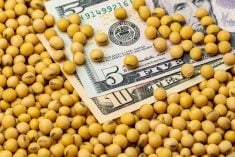Chicago | Reuters — U.S. soybean futures rose for the fourth session in a row on Tuesday, hitting their highest level since Nov. 8, following the soyoil market’s rally to its highest in nearly two years, traders said.
Corn and wheat futures also extended their winning streaks as funds unwound bearish bets on hopes for increased exports following the recent “Phase 1” trade deal between the United States and China.
“There is not a lot of real fresh news, but the demand has been there from the funds to lift us higher,” said Brian Hoops, president of U.S. broker Midwest Market Solutions.
Read Also

China buys U.S. soybean cargoes ahead of Trump-Xi meet, sources say
China’s state-owned COFCO bought three U.S. soybean cargoes, two trade sources said, the country’s first purchases from this year’s U.S. harvest, shortly before a summit of leaders Donald Trump and Xi Jinping.
Chicago Board of Trade January soybean futures settled up 6-3/4 cents at $9.28-3/4 a bushel (all figures US$). CBOT January soyoil gained 2.2 per cent to 33.82 cents/lb., with the most-active contract hitting its highest on a continuous basis since Jan. 5, 2018.
In a move expected to benefit farmers, U.S. lawmakers have amended a government spending bill to extend a tax credit for the biodiesel industry through 2022 and retroactively to when it expired beginning in 2018, a move welcomed by an industry that has seen 10 plants shut since the credit lapsed.
CBOT March corn futures were two cents higher at $3.90 a bushel and CBOT March soft red winter wheat was up 6-1/2 cents at $5.56-1/4 a bushel.
The most-active soft red winter wheat contract briefly topped the 5-1/2-month high it hit on Monday but failed to hold support above that level. CBOT March corn hit resistance at its 100-day moving average after rising to its highest since Nov. 8.
Traders said the grain markets were likely stuck in recent ranges until physical signs of increased exports are noted.
“The phase one trade deal between the U.S. and China is an excellent factor but markets need either to see more detail or to see China actually buying more U.S. agricultural products again,” said Matt Ammermann, commodity risk manager with INTL FCStone.
U.S. commodities also remained supported by Argentina’s decision to boost taxes on its agricultural exports.
The government wants to raise export taxes on wheat and corn to 15 per cent from 12 per cent, Argentina’s Economy Minister Martin Guzman told a news conference. The bill, dubbed by the government the “Social Solidarity and Production Reactivation” project, would also raise the tariff cap on soybean exports to 33 per cent from 30 per cent.
“Argentine export taxes do improve export prospects for U.S. wheat,” Ammermann added. But if U.S. wheat prices rise too much on export optimism, then, ironically, U.S. export competitiveness can be lost.”
— Mark Weinraub is a Reuters commodities correspondent in Chicago; additional reporting by Michael Hogan in Hamburg and Naveen Thukral in Singapore.












